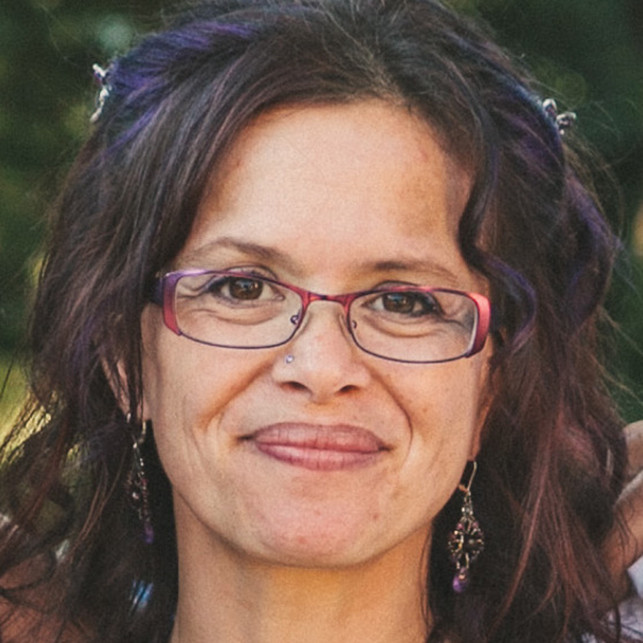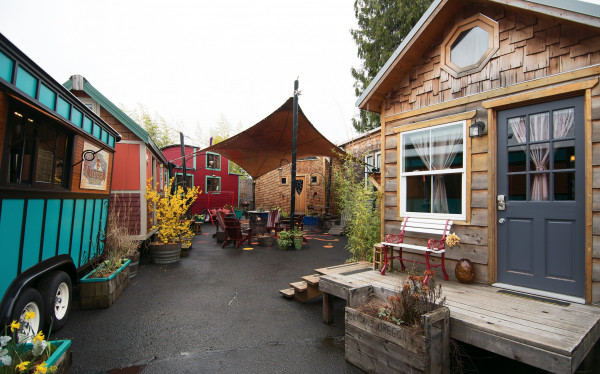Tiny House Hotel Pioneer
Open gallery

Deb Delman MAT ’11
Equipment trailers and catering trucks roll up outside Caravan−The Tiny House Hotel in Northeast Portland’s trendy Alberta Arts District. A production team scurries about preparing to shoot an episode of Portlandia, a comedy series that parodies life in the Rose City.
“They were here from 6 a.m. until 10 p.m., filming in five of our six tiny houses,” says Caravan co-owner Deb Delman, who had a brief campfire cameo with her husband and business partner Kol Peterson. “It was fun hanging out with the actors.”
When Caravan opened in 2013, Delman didn’t anticipate the wave of interest the country’s first tiny house hotel would stir up. Along with articles in the Oregonian and Portland Monthly, the venture garnered national coverage from the New York Times, the Washington Post, Vanity Fair, and NBC News, among others. Interest hasn’t waned.
Caravan’s six unique mobile units are booked a month or two in advance for most of the year. Designed by local builders, they range in size from 120 to 170 square feet and offer electric heat, hot showers, flush toilets, a sitting area, a kitchen, and locally made art along with sustainable fair-trade products. “We attract a wide array of travelers from around the world,” says Delman. “People of all ages come for the experience and also to learn about downsizing, saving money, and reducing their carbon footprint.”

Delman manages hotel operations and community events, while Peterson teaches classes on accessory dwelling units, also known as ADUs. The couple hosts Portland’s annual ADU tour along with frequent tiny house tours and evening bonfires—DIY BBQ, s’mores, and entertainment by local musicians. Delman, who recently discovered the joys of teardrop trailer camping, now rents out five of these small, lightweight trailers for off-site trips. She and Peterson also consult with people interested in opening tiny house hotels.
“We’ve been approached about franchising,” says Delman. “But part of getting older means knowing what you want from life. We’re happy with Caravan and our place in the community.”
A self-described wanderer, Delman has often lived in unusual small dwellings throughout her life: a yurt in Colorado with wood heat and no running water, a barn in Southeast Portland, a garage she remodeled into a cabin-like ADU, and an ADU she built with Peterson in their backyard.
When she arrived in Portland in 2001, Delman began working in the social service sector. In 2003, she cofounded the Pangaea Project, a nonprofit that engaged at-risk youth in local and global social justice projects. The curriculum included time in either Ecuador or Thailand. “When I was young, my grandparents took our family to places like Egypt, Spain, and Thailand,” says Delman. “Those journeys implanted a global identity in me, a connection to the bigger world, and I wanted to share that with youth.”
After nine years as Pangaea’s executive director, Delman decided to strengthen her curriculum development and teaching skills, and earned her MAT at Lewis & Clark’s Graduate School of Education and Counseling. She went on to teach at Lincoln High School for three years, focusing on ways to make history relevant in students’ lives. “Lewis & Clark is an amazing incubator for creative people who want to have an impact,” she says.
Simultaneously, Delman and her husband entertained the idea of converting a vacant lot near her home into a tiny house hotel. She educated herself and city agencies about her vision for Caravan, likening approved zoning for food cart pods to her hotel concept. “At the time, there was no absolutely no precedent for our idea,” she says.
The speed at which Caravan took off surprised and delighted Delman. Along with individual bookings, they host group events like weddings, baby showers, and birthday parties. Over the Fourth of July holiday, she reserved the entire compound to celebrate with family.
“I love that our business is dynamic and has multiple moving parts. No day is ever the same,” says Delman. “We’ve created a community environment with our staff, one that translates into a welcoming experience for our visitors and guests.”
—by Pattie Pace
More L&C Magazine Stories
Lewis & Clark Magazine is located in McAfee on the Undergraduate Campus.
MSC: 19
email magazine@lclark.edu
voice 503-768-7970
fax 503-768-7969
The L&C Magazine staff welcomes letters and emails from readers about topics covered in the magazine. Correspondence must include your name and location and may be edited.
Lewis & Clark Magazine
Lewis & Clark
615 S. Palatine Hill Road MSC 19
Portland OR 97219

